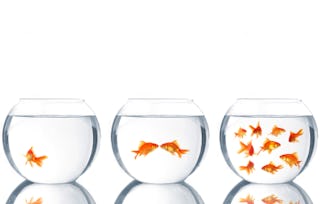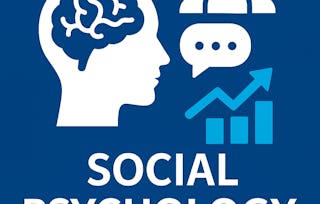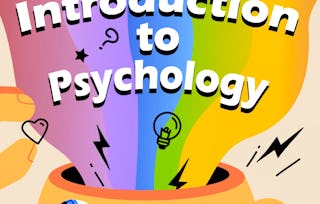What are people most afraid of? What do our dreams mean? Are we natural-born racists? What makes us happy? What are the causes and cures of mental illness? This course tries to answer these questions and many others, providing a comprehensive overview of the scientific study of thought and behavior. It explores topics such as perception, communication, learning, memory, decision-making, persuasion, emotions, and social behavior. We will look at how these aspects of the mind develop in children, how they differ across people, how they are wired-up in the brain, and how they break down due to illness and injury.

Ends soon: Gain next-level skills with Coursera Plus for $199 (regularly $399). Save now.

(32,389 reviews)
Skills you'll gain
Details to know

Add to your LinkedIn profile
6 assignments
See how employees at top companies are mastering in-demand skills

There are 7 modules in this course
Meet Paul Bloom, your instructor.
What's included
1 video3 readings
In this module, you will learn about foundational psychological theories and findings in psychology. We will start with the discovery that our mental lives have a physical basis, introducing the field of neuroscience. And then we will turn to two major psychological theories that have come to shape the world that we now live in—Freud’s psychodynamic theory and Skinner’s theory of behaviorism.
What's included
17 videos3 readings1 assignment
In this module, you will learn about foundational psychological research into development and language. Specifically, you will learn about methods for studying how infants and children think and the core discoveries that they have led to. Then you will learn about the structure of language, how language is learned, and end with a little bit on animal communication, language processing, and relationship between language and thought.
What's included
14 videos2 readings1 assignment
In this module, you will learn about cognitive psychology. Specifically, you will learn about how we perceive the world, how attention works, and we store our experiences in memory.
What's included
12 videos2 readings1 assignment1 plugin
In this module, you will learn about psychology examining the self and others. Specifically, in the first half, you will learn about social and non-social emotions. In the second half, you will learn about how we deal with other people—social psychology.
What's included
15 videos2 readings1 assignment
In this module, you will learn human variation. The focus will focus on personality and intelligence, and the role of genes and environment in explaining individual differences. The second half will focus on clinical psychology by reviewing prominent mental illnesses and therapies.
What's included
13 videos2 readings1 assignment
In the final module, you will learn how psychologists measure happiness and what factors contribute to the good life
What's included
7 videos2 readings1 assignment
Instructor

Offered by
Explore more from Psychology
 Status: Preview
Status: PreviewUniversity of Toronto
 Status: Preview
Status: PreviewO.P. Jindal Global University
 Status: Preview
Status: PreviewO.P. Jindal Global University
 Status: Preview
Status: PreviewNational Taiwan University
Why people choose Coursera for their career




Learner reviews
32,389 reviews
- 5 stars
87.69%
- 4 stars
10.97%
- 3 stars
0.85%
- 2 stars
0.15%
- 1 star
0.31%
Showing 3 of 32389
Reviewed on Jan 23, 2019
I highly recommend this course to anyone willing to understand about the basic history and origins of psychology, scientific approach but full of insights and inspiration to go further in the matter.
Reviewed on Jun 26, 2020
This was my second course using this site, and with Professor Bloom, and once again it was great. I've genuinely learnt a lot, and I've found a new love for psychology I never would have found before.
Reviewed on Mar 13, 2024
An excellent course to get a general idea about psychology as well as understanding of what to do next if you are into learning more. Very useful links for extra reading. And very engaging instructor.

Open new doors with Coursera Plus
Unlimited access to 10,000+ world-class courses, hands-on projects, and job-ready certificate programs - all included in your subscription
Advance your career with an online degree
Earn a degree from world-class universities - 100% online
Join over 3,400 global companies that choose Coursera for Business
Upskill your employees to excel in the digital economy
Frequently asked questions
This course combines complex subject matter with high-end animation. Learn about Julia Veldman, a visual storyteller at http://www.juliaveldmanc.nl/
To access the course materials, assignments and to earn a Certificate, you will need to purchase the Certificate experience when you enroll in a course. You can try a Free Trial instead, or apply for Financial Aid. The course may offer 'Full Course, No Certificate' instead. This option lets you see all course materials, submit required assessments, and get a final grade. This also means that you will not be able to purchase a Certificate experience.
When you purchase a Certificate you get access to all course materials, including graded assignments. Upon completing the course, your electronic Certificate will be added to your Accomplishments page - from there, you can print your Certificate or add it to your LinkedIn profile.
More questions
Financial aid available,

